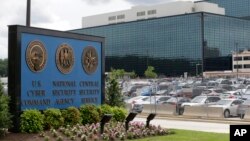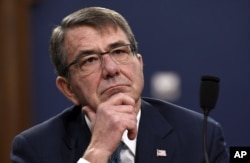The Pentagon has launched a new cyber task force to counter the Islamic State group, and officials say it is creating advantages both in cyberspace and on the battlefield.
The task force, JTF-Ares, was developed in May and is in its “initial operation phase,” U.S. Cyber Command spokesman Joe Holstead said.
The military has carried out several cyber offensive operations against IS militants, which experts say have produced many coalition successes in the last few months.
“There’s no bang, and there’s no explosion, but it does give you a military advantage,” said James Lewis of the Center for Strategic and International Studies.
During a Pentagon news briefing earlier this year, Secretary of Defense Ash Carter said the U.S. military was looking to “accelerate” the cyber war against IS in order to “physically and virtually isolate” the terror group.
Holstead said the new task force is a part of that acceleration effort, using both operations and intelligence professionals from all military branches to “improve efficiencies” and unify cyber efforts for a “focused and sustained cyberspace campaign in support of the broader counter-ISIL [Islamic State] efforts in Syria and Iraq.”
A defense official, speaking to VOA on the condition on anonymity, confirmed Wednesday that specific cyber tools were being developed and integrated into the coalition battle, but declined to give details because of operational sensitivities.
Disruptive effects
Carter has said the U.S. is using cyber attacks to interrupt IS command and control, to cause the militants to lose confidence in their networks and to overload their networks so that they can't function. Some penetrations have interrupted supply chains or sent enemy combatants to the wrong places, according to Lewis, who directs the CSIS Strategic Technologies Program.
Colonel Chris Garver, a spokesman for the U.S.-led coalition fighting IS in Iraq and Syria, told VOA on Tuesday that the coalition had reaped the benefits from this disruption of networks through both cyber attacks coming out of U.S. Cyber Command and kinetic attacks on the ground.
“Just as when we attack a radio station, the disruption by cyber attacks fits into that,” Garver said in a phone interview from Baghdad. “It’s harder to count than the bombs we drop, but it certainly has an effect.”
Garver told reporters last week via teleconference that the coalition had seen changes in the terror group’s communication structure as multiple attacks on its networks forced the use of other means of transferring information.
IS leaders communicate with their fighters by cellphones, push-to-talk radios, internet applications and emails. On the battlefield, the coalition has focused on bombing IS headquarters to destroy large amounts of communications devices at once, but strikes do not always happen immediately.
“We may be listening, we may be watching,” Garver told reporters, “and we may not hit that right away because we want to keep using that to gather intelligence.”
Eliminate or infiltrate
Speaking with VOA, Garver added that the same concept was true in cyber warfare against IS.
“Say you’ve identified a jihadist website," he said. "You can zap it, or before you lay waste to it and let them know it’s been hacked, you may choose to infiltrate their networks without ever letting them know you’re doing it.”
Before launching an attack against IS or the Taliban — either a physical attack or a cyber raid — U.S. defense officials must follow a process that leads them to decide whether such action outweighs the intelligence benefit that could be gained by continuing to listen and watch the enemy, according to experts and an official inside the department.
“It's a question every time,” Lewis of CSIS told VOA.
Lewis said cyber attacks against IS are “relatively new” because U.S. Cyber Command previously lacked the capacity to launch these types of assaults.
He said the military had increased its expertise by putting a lot of resources into developing both the doctrine and the workforce that could carry out these attacks.
“It’s a matter of prioritizing, and if it’s a priority, you find a way to get the experts and tools you need,” a defense official told VOA on the condition of anonymity.






